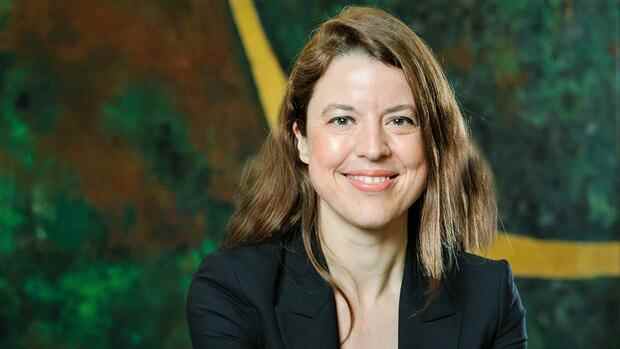The long-standing KPMG partner is the first woman to sit on the DSGV board.
(Photo: KPMG)
Frankfurt Karolin Schriever is a Sparkasse child – in the truest sense of the word. Her parents worked for the Sparkasse Werl and the administration of the city of Werl and met each other there. After graduating from high school, Schriever trained as a bank clerk. At the Sparkasse, of course.
After completing her business studies at the Dortmund University of Applied Sciences, Schriever worked in the private sector for 16 years – at the consulting firm KPMG. Her wish from her student days to return to the Sparkasse family at some point was fulfilled in 2022.
The 44-year-old has been an executive board member of the German Savings Banks and Giro Association (DSGV) since September, where she is responsible for the economics, politics and bank management departments. Her predecessor Karl-Peter Schackmann-Fallis has trained her in recent weeks. He himself will retire in November.
Schriever is now on his own – and a role model and pioneer at the same time. She is the first woman on the executive committee of the DSGV, which has been dominated by men for years. The proportion of women on the boards of the around 360 savings banks is also manageable – at the beginning of October it was just 6.4 percent.
Top jobs of the day
Find the best jobs now and
be notified by email.
Schriever is convinced that diverse teams are more successful. As a member of the DSGV board, she also wants to work to ensure that even more women get into management positions in the savings bank finance group. “There’s still room for improvement,” she says. The DSGV represents the interests of savings banks, state banks and state building societies, which together are the market leaders in the German financial market.
Schriever wants to convince with numbers, data and facts
At KPMG, Schriever has specialized in the regulatory review of banks and financial service providers. From 2014 to 2017, she helped set up the corresponding advisory services there. From 2017, the area of sustainability was added. As a partner, the auditor most recently managed a department with 80 people.
Technically, no one can fool Schriever at the DSGV. In her new role, however, she wants and needs to expand her network of contacts in politics. Schriever appreciates the work of parties and finds political processes exciting, but unlike her predecessor, she is not a member of a party.
Karl-Peter Schackmann-Fallis is a member of the SPD and, before joining the DSGV, worked, among other things, as State Secretary in the finance ministries in Saxony-Anhalt and Brandenburg.
As a lobbyist, Schriever wants to continue to pursue the approach of convincing her counterpart in terms of content. “I like working with numbers, data and facts as well as concrete solutions,” she says. “Those who remain too general are often not heard.”
Sustainability is one of the most important issues
When the DSGV, headed by Helmut Schleweis, President of the Savings Bank, speaks up, its influence in public and politics is great. Because the public-law institutes represented by the DSGV have a combined business volume of 3.3 trillion euros and employ 284,800 people. This is shown by the most recently published figures from the end of 2021.
At the same time, the Savings Banks Finance Group is not a hierarchically managed group. The individual institutes and regional associations are independent and regularly argue with each other – both with each other and with the DSGV. Tensions are still high, especially between savings banks and state banks.
Schriever now has to find his way around in this very special environment and also cultivate relationships with the supervisory authorities. They were angry at the sector because of the months of impasse in the rescue of troubled state banks and have therefore demanded a multi-billion dollar restructuring of the joint security system.
In view of the Russian war of aggression in Ukraine and high inflation, an issue that Schriever has been working on for a long time has also receded into the background: sustainability. The new DSGV board member is convinced that this will be one of the most important issues for all banks in the coming years.
“There is still a need for adjustment on the regulatory side,” says Schriever. The Green Asset Ratio planned by the EU, which measures the proportion of sustainable financing in bank balance sheets, has so far only taken into account companies that are already green. “But it is particularly important that banks and savings banks support companies that are still on the way to becoming green.”
More: Savings Banks President Helmut Schleweis: Real estate business “slumped from one day to the next”.
